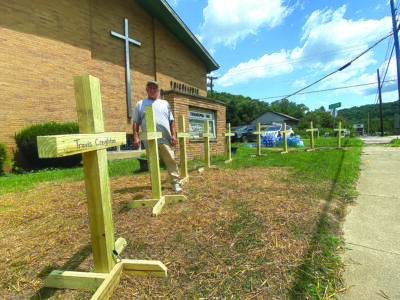Homeless given two weeks before encampments are cleared

Photo by Eric Ayres New notices were posted in this homeless encampment situated under a bridge over Wheeling Creek and a handful of others where criminal activity prompted Wheeling Police to initiate action to have them cleared. This week, a judge outlined requirements that must be met before homeless people in these camps can be removed.
WHEELING — New notices were posted Thursday and two more weeks were given before a handful of homeless encampments in Wheeling are expected to be cleared.
The new notices give people living in the affected camps along Wheeling Creek until Oct. 2 to relocate.
On that date, the encampments will be dismantled and any individuals remaining there will be escorted off the premises. The sites — which are situated on property owned by the State of West Virginia — will then be closed to the public with “No Trespassing” signs posted on the property.
Controversy over the removal of homeless people from these camps came to a head this week after a federal judge issued an order Wednesday in a civil case brought against the city of Wheeling. That case seeking a restraining order and preliminary injunction was filed in the U.S. District Court for the Northern District of West Virginia, with Mervin B. Sturgeon — a homeless man living in one of the camps that was to be dismantled — listed as plaintiff, along with “others similarly situated.”
Wheeling Police initiated the action earlier this month to get the camps dismantled because of an ongoing problem with criminal activity officials say is linked to a handful of the homeless encampments in the city. After police initially posted notices that the camps were set to be cleared earlier this month on Sept. 4, the American Civil Liberties Union of West Virginia publicly announced its intention to take civil action against the city in order to prevent the residents of the homeless encampments of being displaced.
Shortly after the ACLU-WV filed the federal lawsuit Sept. 2, city officials announced that two additional weeks would be given before action would proceed to clear the camps. That deadline had been extended to today.
U.S. District Court Judge John Preston Bailey’s order Wednesday grants in-part and denies in-part the emergency motion for a temporary restraining order and preliminary injunction. The 11-page order described a course of action that representatives of both the ACLU and the police department described as fair.
“We’re pleased the Court agrees that the amount of notice given to the encampment residents to vacate their homes — 72 hours — was woefully insufficient and does not meet the standards required by the Constitution,” the ACLU-WV announced in a statement after the order was issued by the court. “The decision today means that the city must now provide a minimum of two weeks notice to residents before dismantling an encampment. We appreciate the court requiring better notice from the city and affirming the rights of some of our state’s most vulnerable residents.
“We now hope the city will step back now and reconsider moving forward and displacing these community members. We are in the midst of a global pandemic, and to move these residents from their homes without access to safe and adequate housing is in contravention to CDC guidelines and creates a significant public health risk.”
As part of the order, if homeless inhabitants of the sites are still there when crews come to clear them on Oct. 2, they must be given two hours to gather up their belongings. The judge, in his order, described in great detail the matter of personal effects of the homeless individuals, “however humble, they are entitled to the protection of the Fourth Amendment.”
The order also stated that notices must be posted two weeks prior to their intended action, and two-week notices also must be provided to the Greater Wheeling Coalition for the Homeless, Project Hope and any other group or agency which requests to be included in such notifications.
It is not known how many members of the homeless community will be displaced by the removal of these camps. According to the order, there were approximately 78 people living in homeless encampments in the city, but the exact number of people in the affected camps often varied.
“A lot of these folks are transient, so it’s hard to say,” Wheeling Police Chief Shawn Schwertfeger said. “It really changes day to day.”
According to the order, the court pointed out that the Wheeling Police Department and the West Virginia Division of Highways were not appropriate defendants in the civil action, although the police initiated the course of action to remove the encampments and the DOH had jurisdiction over the property where its bridges span the creek. The court dismissed the police department as a defendant and substituted the State of West Virginia, according to the order.
Schwertfeger said it will be the Division of Highways that will clear the property on Oct. 2. However, if state crews need assistance from the city police department, they will be there if requested.
“It’s a little bit of a different situation than what we had back in April,” Schwertfeger said Thursday, describing a previous situation when a rash of criminal activity resulted in the removal of camps further up the creek on city-owned property.
The ACLU-WV also intervened during that episode, demanding that the city identify alternative housing for the individuals being displaced during the global COVID-19 pandemic.
In this most recent case, the police chief indicated he hoped the resolution works best for all involved in this challenging situation.
“I think the judge’s ruling was fair, and I hope we accomplished what we set out to accomplish,” Schwertfeger said. “This is all about crime. There are multiple camps — 20 or so in the city — that are not impacted by this at all. But for the camps we’re talking about, it’s become a public safety issue — and in my opinion — a public health issue.”
Earlier this month, the police chief outlined a list of criminal complaints linked to the homeless encampments in question, which are located closer to the downtown area near bridges over Wheeling Creek. In addition to scores of calls for police assistance stemming from activity at the camps, the chief described booby traps on trails leading to some of these areas, camps strewn with hypodermic needles and unsanitary conditions, as well as one case in which a female had died in a tent, and the death was not reported for several days.
“This is private property, and the (DOH) will be responsible for cleanup,” the chief said. “From what I’ve been told, they will be posting ‘No Trespassing’ signs after the sites are cleared.”
Members of Wheeling City Council this week were urged by a room full of people in council chambers to take action that helps the homeless community, which is populated by individuals ranging from mentally ill and drug addicted people to those who are simply down on their luck and need help.
City officials have discussed plans to coordinate efforts of all the local agencies that help the homeless in order to bring everyone on the same page.
“We have to look at ways to bring more people together and accomplish these goals constructively, with law enforcement being the last resort,” said Wheeling Mayor Glenn Elliott. “But when we have active crimes taking place within city limits, I think it’s inappropriate for anyone on council to ask our city staff to do anything else but enforce those laws. So it’s a very difficult issue.”


